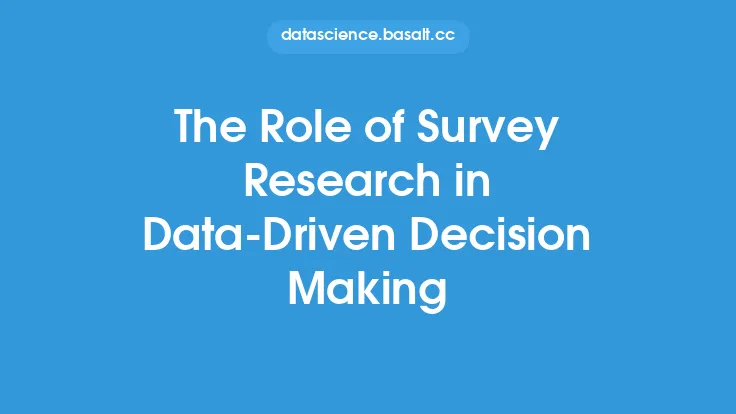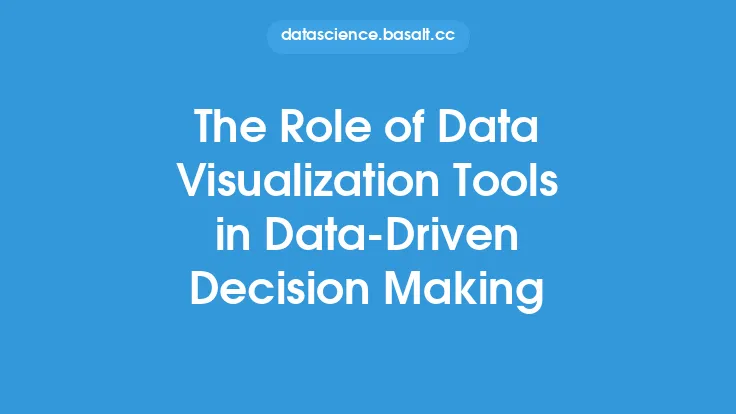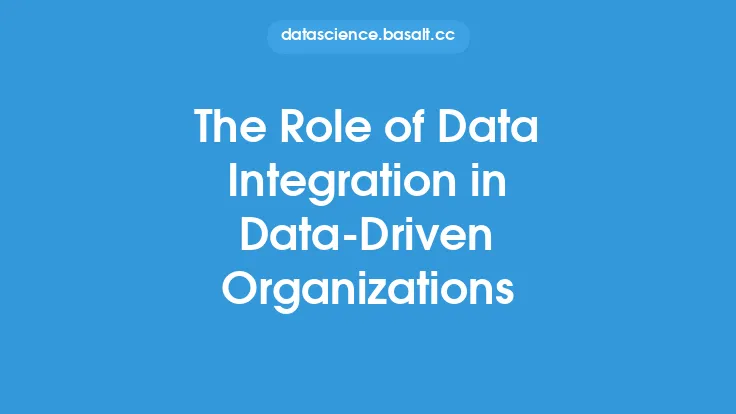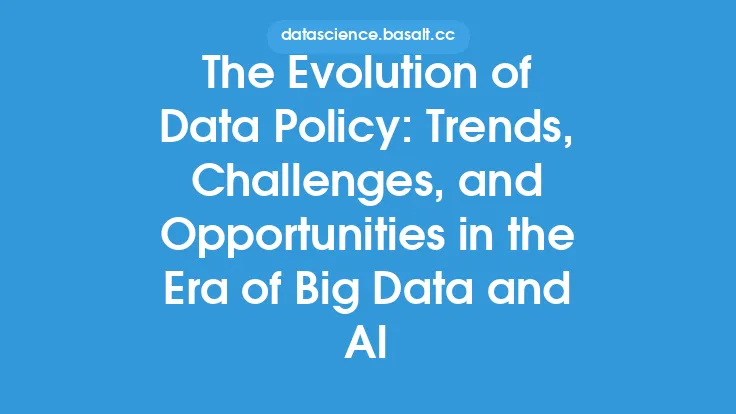In today's data-driven world, organizations are constantly seeking ways to leverage their data assets to drive business growth, improve decision-making, and foster innovation. A crucial aspect of achieving these goals is creating a data-driven culture that encourages collaboration, transparency, and data-informed decision-making. At the heart of this culture is a well-defined data policy that outlines the rules, guidelines, and procedures for managing and utilizing data across the organization. In this article, we will explore the role of data policy in fostering collaboration and innovation, and provide insights into how organizations can create a data-driven culture that drives business success.
Introduction to Data-Driven Culture
A data-driven culture is an organizational culture that values data as a strategic asset and uses it to inform decision-making, drive business outcomes, and foster innovation. In a data-driven culture, data is democratized, and access to data is provided to all stakeholders who need it to perform their jobs. This culture encourages collaboration, transparency, and accountability, and provides a framework for data governance, data quality, and data security. A well-defined data policy is essential for creating a data-driven culture, as it provides the rules, guidelines, and procedures for managing and utilizing data across the organization.
The Role of Data Policy in Fostering Collaboration
Data policy plays a critical role in fostering collaboration across the organization. By providing a clear understanding of data ownership, data governance, and data management, data policy helps to break down silos and encourages collaboration among different departments and teams. A well-defined data policy ensures that all stakeholders have access to the data they need to perform their jobs, and provides a framework for data sharing, data integration, and data analysis. This, in turn, enables organizations to make better-informed decisions, drive business outcomes, and foster innovation. For example, a data policy that outlines the procedures for data sharing and data integration can help to facilitate collaboration between the sales and marketing teams, enabling them to develop targeted marketing campaigns that drive business growth.
The Role of Data Policy in Fostering Innovation
Data policy also plays a critical role in fostering innovation across the organization. By providing a framework for data experimentation, data analysis, and data visualization, data policy enables organizations to identify new business opportunities, develop new products and services, and improve existing ones. A well-defined data policy ensures that data is accurate, complete, and consistent, and provides a framework for data quality, data security, and data governance. This, in turn, enables organizations to develop innovative solutions that drive business growth, improve customer satisfaction, and foster competitiveness. For example, a data policy that outlines the procedures for data experimentation and data analysis can help to facilitate the development of new products and services, such as personalized customer experiences, predictive maintenance, and smart cities.
Key Components of a Data Policy
A data policy typically consists of several key components, including data governance, data management, data quality, data security, and data compliance. Data governance outlines the rules and procedures for managing and utilizing data across the organization, while data management outlines the procedures for data collection, data storage, data processing, and data dissemination. Data quality outlines the procedures for ensuring that data is accurate, complete, and consistent, while data security outlines the procedures for protecting data from unauthorized access, use, or disclosure. Data compliance outlines the procedures for ensuring that data is collected, stored, and used in compliance with relevant laws, regulations, and industry standards.
Best Practices for Creating a Data-Driven Culture
Creating a data-driven culture requires a combination of people, processes, and technology. The following are some best practices for creating a data-driven culture:
- Develop a clear and concise data policy that outlines the rules, guidelines, and procedures for managing and utilizing data across the organization.
- Establish a data governance framework that outlines the roles and responsibilities of different stakeholders, including data owners, data stewards, and data users.
- Provide training and education to all stakeholders on data policy, data governance, and data management.
- Encourage collaboration and transparency across the organization, and provide access to data to all stakeholders who need it to perform their jobs.
- Develop a data quality framework that outlines the procedures for ensuring that data is accurate, complete, and consistent.
- Develop a data security framework that outlines the procedures for protecting data from unauthorized access, use, or disclosure.
- Monitor and evaluate the effectiveness of data policy, and make adjustments as needed.
Technical Considerations for Implementing a Data Policy
Implementing a data policy requires a combination of technical and non-technical considerations. The following are some technical considerations for implementing a data policy:
- Data architecture: A well-defined data architecture is essential for implementing a data policy. This includes the design of data warehouses, data lakes, and data marts, as well as the development of data pipelines and data workflows.
- Data governance tools: Data governance tools, such as data catalogs, data dictionaries, and data lineage tools, are essential for implementing a data policy. These tools provide a framework for data discovery, data classification, and data certification.
- Data quality tools: Data quality tools, such as data validation tools, data cleansing tools, and data transformation tools, are essential for ensuring that data is accurate, complete, and consistent.
- Data security tools: Data security tools, such as encryption tools, access control tools, and authentication tools, are essential for protecting data from unauthorized access, use, or disclosure.
- Cloud computing: Cloud computing provides a scalable and flexible platform for implementing a data policy. This includes the use of cloud-based data warehouses, cloud-based data lakes, and cloud-based data governance tools.
- Artificial intelligence and machine learning: Artificial intelligence and machine learning provide a framework for automating data governance, data quality, and data security. This includes the use of machine learning algorithms for data classification, data clustering, and data prediction.
Conclusion
In conclusion, creating a data-driven culture is essential for driving business growth, improving decision-making, and fostering innovation. A well-defined data policy is at the heart of this culture, providing the rules, guidelines, and procedures for managing and utilizing data across the organization. By fostering collaboration, transparency, and data-informed decision-making, data policy enables organizations to make better-informed decisions, drive business outcomes, and foster innovation. By following best practices and considering technical and non-technical considerations, organizations can create a data-driven culture that drives business success.





